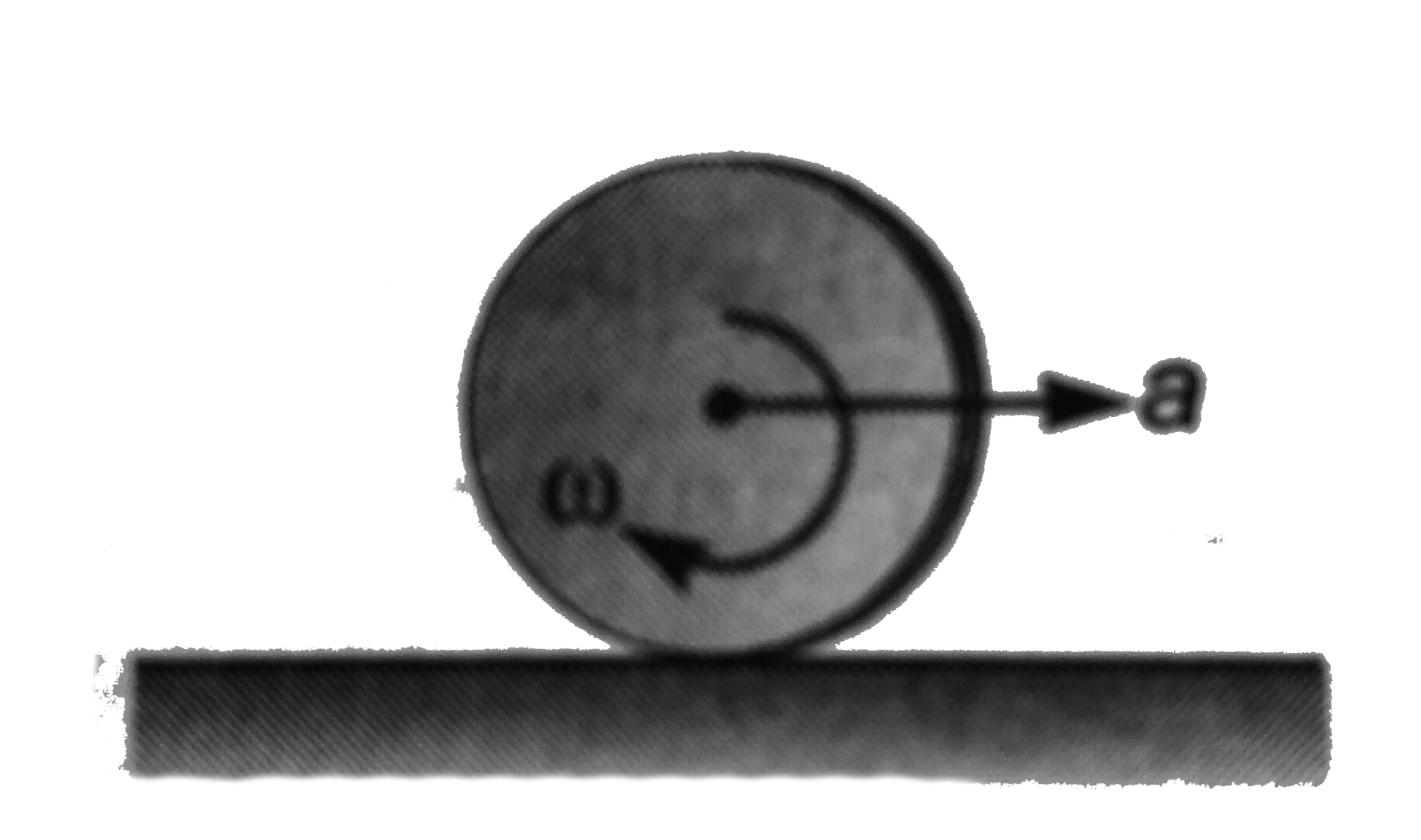Consider an expanding sphere of instantaneous radius ? whose total mass remains constant. The expansion is such that the instantaneous density ρ remains uniform throughout the volume. The rate of fractional change in density (dpρdt) is constant. The velocity v of any point on the surface of the expanding sphere is proportional to
R
R3
1R
R2/3
The correct Answer is:a
Total mass of the object = Volume × Density M =ρV
Differentiationg both sides.
ρdVdt+Vdρdt=0
ρdVdt=−Vdρdt
1vdVdt=−1ρdρdt
As it is given the question that 1ρdρdt is a constant let it be equal to K .
1VdVdt=k
dVdt=−KV .....(i)
The instantaneous volume of the sphere is given by V=43πR3
dVdt=4πR2dRdt
From eqution (i)
4πR2dRdt=−KV
4πR2dRdt=−K(43πR3)
dRdt=−K3R ......(ii)
The velocity of any point on the sphere will be .
v=dRdt
Thus , v=K3R
Hence , the correct option is (a).
Topper's Solved these Questions
- BOOK - MODERN PUBLICATIONCHAPTER - MOTION IN A STRAIGHT LINE EXERCISE - COMPETITION FILE ( C.(MULTIPLE CHOICE QUESTIONS))13videos
MOTION IN A STRAIGHT LINE
- BOOK - MODERN PUBLICATIONCHAPTER - MOTION IN A STRAIGHT LINE EXERCISE - COMPETITION FILE ( D.(MULTIPLE CHOICE QUESTIONS))9videos
MOTION IN A STRAIGHT LINE
- BOOK - MODERN PUBLICATIONCHAPTER - MOTION IN A STRAIGHT LINE EXERCISE - COMPETITION FILE ( A.(MULTIPLE CHOICE QUESTIONS))20videos
MOTION IN A STRAIGHT LINE
- BOOK - MODERN PUBLICATIONCHAPTER - MOTION IN A PLANE EXERCISE - Chapter Practice Test15videos
MOTION IN A PLANE
- BOOK - MODERN PUBLICATIONCHAPTER - OSCILLATIONS EXERCISE - Practice Test (For Board Examination)12videos
OSCILLATIONS
Similar Questions
Atmosphere of a planet contains only an ideal gas of molar mass M0. The temperature of the atmosphere varies with height such that the density of atmosphere remains same throughout. The planet is a uniform sphere of mass M and radius ‘a’. Thickness of atmosphere is small compared to ‘a’ so that acceleration due to gravity can be assumed to be uniform throughout the atmosphere.
(a) Find the temperature difference between the surface of the planet and a point at height H in its atmosphere
(b) If the rms speed of gas molecules near the surface of the planet is half the escape speed, calculate the temperature of the atmosphere at a height H above the surface. Assume CpCV=γ for the atmospheric gasView SolutionThe earth is a homogeneous sphere of mass M and radius R. There is another spherical planet of mass M and radius R whose density changes with distance r from the centre as p=p0r. (a) Find the ratio of acceleration due to gravity on the surface of the earth and that on the surface of the planet. (b) Find p0.
View Solution
Knowledge Check
- Question 1 - Select One
An insulating solid sphere of the radius R is charged in a non - uniform manner such that the volume charge density ρ=Ar, where A is a positive constant and r is the distance from the centre. The potential difference between the centre and surface of the sphere is
AAR8ε0BAR4ε0CARε0DAR2ε0 - Question 2 - Select One
An insulating solid sphere of the radius R is charged in a non - uniform manner such that the volume charge density ρ=Ar, where A is a positive constant and r is the distance from the centre. The potential difference between the centre and surface of the sphere is
AAR8ε0BAR4ε0CARε0DAR2ε0 - Question 3 - Select One
A sphere of radius R has a volume density of charge ρ=kr, were r is the distance from the centre of the sphere and k is constant . The magnitude of the electric field which exists at the surface of the sphere is given by (ε0= permittivity of free space)
A4πkR43ε0BkR3ε0C4πkRε0DkR24π0
A spherical region of space has a distribution of charge such that the volume charge density varies with the radial distance from the centre r as ρ=ρ0r3,0≤r≤R where ρ0 is a positive constant. The total charge Q on sphere is
View Solution
A ring of radius R rolls on a horizontal surface with constant acceleration a of the centre of mass as shown in figure. If ω is the instantaneous angular velocity of the ring. Then the net acceleration of the point of contact of the ring with gound isView SolutionA conducting sphere of radius 0.1 m has a uniform positive charge density of 1.8μC/m2 on its surface. The electric field in V/m in free space at a radial distance of 0.2m from a point on the surface of the sphere is given by
View SolutionA solid sphere of radius R has a volume charge density ρ=ρ0r2 (where ρ0 is a constant ans r is the distance from centre). At a distance x from its centre (for x<R), the electric field is directly proportional to :
View SolutionA spherical charged conductor has surface charge density σ.The intensity of electric field and potential on its surface are E and V .Now radius of sphere is halved keeping the charge density as constant .The new electric field on the surface and potneial at the centre of the sphere are
View Solution

